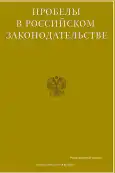Proceeding Activity of the Court: Arguments for and Against. About the Search for Balance
- Authors: Berova J.M.1, Akkaeva K.A.1
-
Affiliations:
- North Caucasus Institute for Advanced Studies (branch) of the Krasnodar University of the Ministry of Internal Affairs of Russia
- Issue: Vol 15, No 5 (2022)
- Pages: 365-369
- Section: Articles
- URL: https://journal-vniispk.ru/2072-3164/article/view/147645
- ID: 147645
Cite item
Abstract
Full Text
##article.viewOnOriginalSite##About the authors
Juliet Mikhailovna Berova
North Caucasus Institute for Advanced Studies (branch) of the Krasnodar University of the Ministry of Internal Affairs of Russia
Email: lel4993@mail.ru
Dr.Sci.(Law), Police Colonel, Deputy Head Nalchik, Russia
Khalimat Alievna Akkaeva
North Caucasus Institute for Advanced Studies (branch) of the Krasnodar University of the Ministry of Internal Affairs of RussiaCand.Sci.(Law), Associate Professor, Police Colonel, Head of the Special-Technical Disciplines Department Nalchik, Russia
References
- Ananyin D.M. Procedural activity of the court in countering the abuse of procedural rights // Electronic supplement to the Russian legal journal. 2019. No. 4. S. 87-91.
- Andryushchenko T. I. The court is obliged to prove the circumstances in a criminal case // Gaps in Russian legislation. 2010. No. 4. S. 241-244.
- Lazarev S.V. The principle of judicial leadership: history and modernity // Principles of civil, arbitration and administrative proceedings: problems of theory and practice: a collection of scientific articles. Comp. and ed. L.V. Voitovich. St. Petersburg, 2021, pp. 31-48.
- Merzekhanov S.F. The principle of procedural activity of the court in administrative proceedings // North Caucasian Legal Bulletin. 2021. No. 2. S. 135-139.
- Review of certain issues of judicial practice related to the adoption by the courts of measures to counter illegal financial transactions (approved by the Presidium of the Supreme Court of the Russian Federation on 07/08/2020) // Bulletin of the Supreme Court of the Russian Federation. 2020. No. 12.
- Ovchinnikova E.A. Criminal procedural competence of the court, judges: results of historical and legal research // Socio-political sciences. 2019. No. 6. P. 102-108.
- Potapenko E.G. Limitation of the activity of the court when changing the legal qualification of the dispute and (or) the method of protecting the right // Russian judge. 2021. No. 11. P. 14 - 18.
- Chechuevsky N.V. The axiological role of the court in criminal proceedings // Gaps in Russian legislation. 2019. No. 3. S. 181-184.
- Chistilina D.O. The principle of competitiveness and the activity of the presiding judge in court with the participation of jurors: problems of theory and practice // Bulletin of the South-Western State University. series: history and law. 2019. V. 9. No. 4. S. 72-81.
- Shinkaruk V. M., Perekrestov V. N. The role of the court in establishing objective truth in criminal cases in the light of the constitutional principle of competition // Bulletin of the Voronezh Institute of the Ministry of Internal Affairs of Russia. 2018. №2. pp. 195-201.
Supplementary files








